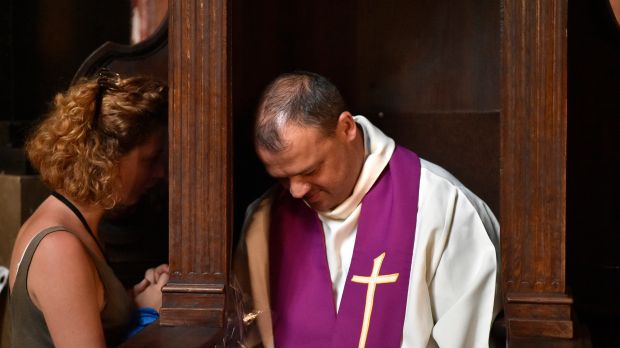Monday 24 October 2022
~
1. The Seal of Confession could be latest casualty of sex abuse crisis
2. Cardinal Tagle explains why the Holy See extended its agreement with China
3. Vatican invites Protestant, Orthodox theologians to debate Petrine primacy
4. Kazakhstan and the Holy See : 30 years of diplomatic relations
5. In the United States, a divided country and a divided Church
~
1The Seal of Confession could be latest casualty of sex abuse crisis
The final report of the Independent Inquiry into Child Sexual Abuse (IICSA) in England and Wales recommends legislation that will make the reporting of child abuse mandatory. The document specifically adds that no exemption should be granted for sacramental confession. Thus, mandatory reporting “should be an absolute obligation; it should not be subject to exceptions based on relationships of confidentiality, religious or otherwise,” the text reads. For Crux, this could lead to a conflict with the Church. If the government were to legislate on this issue, it would mean that if a priest were to hear a sacramental confession where he learned about child abuse, he could be subjected to criminal prosecution if he failed to report it to the authorities. Yet under Church law, violating the seal of confession is an excommunicable offense and priests are expected to defend the seal, even with their lives. In an age where the sacrament is declining, as fewer Catholics seem to partake in it, many faithful could support an exception for child abuse in confession. However, many Catholics may realize the slippery slope this could lead to, Crux analyses, as the State might make exceptions for other sins it is interested in such as embezzlement or tax evasion. Additionally, many experts believe that even if abuse cases revealed in confession were to be reported to the authorities, it wouldn’t make much difference: Abusers don’t usually confess, and certainly wouldn’t if they knew it would be reported. The most likely outcome would be unscrupulous journalists “confessing” abusing children to see if the priest actually makes a report to the authorities, the American media outlet warns.
Crux, English
2Cardinal Tagle explains why the Holy See extended its agreement with China
In an interview with Gianni Valente, the director of Fides news agency, which is run by the Pontifical Mission Societies, Cardinal Luis Tagle explains the Holy See’s motivations for extending the Provisional Agreement with China over the appointment of bishops. The agreement was extended last Saturday, 22 October, for another two years, after first being introduced in 2018 and then renewed in 2020. Six bishops have been appointed since the agreement first entered into force. Cardinal Tagle explained that the Holy See wants “to favor the choice of good Chinese Catholic bishops, who are worthy and suitable to serve their people,” and that “the reason for everything is to safeguard the valid apostolic succession and the sacramental nature of the Catholic Church in China.” The Filipino Cardinal underlined that “this can reassure, comfort and enliven baptized Catholics in China,” emphasizing that the “sensus fidei witnessed by” the faithful in the country, “is always comforting.” It is “a precious testimony, which often sprouted not in well-cultivated and protected gardens, but on harsh and uneven grounds,” he continued. Cardinal Tagle also recognized the many criticisms the agreement has received, saying that the “the Holy See does not ignore and does not even minimize the differences of reactions among Chinese Catholics in the face of the agreement, where the joy of many is intertwined with the perplexities of others.” However, he also emphasized that “no one has ever shown naive triumphalisms” and this is all part of a long process which requires dirtying “one’s hands with the reality of things as they are.” “Many signs attest that many Chinese Catholics have grasped the inspiration followed by the Holy See in the ongoing process. They are grateful and comforted for a process that confirms before all their full communion with the Pope and the universal Church,” he explained. The Filipino Cardinal also said that listening to the arguments and objections of the government helped them understand the context and mindset of their interlocutors and pushed them to develop new ways of communicating the Church’s goal.
Vatican News, English
3. Vatican invites Protestant, Orthodox theologians to debate Petrine primacy
The Vatican will host a debate on November 22 in St. Peter’s Basilica between a Catholic, a Protestant, and an Orthodox theologian on the primacy of Peter, titled “On this rock I will build my Church.”
Catholic News Agency, English
4. Kazakhstan and the Holy See: 30 years of diplomatic relations
Kazakhstan and the Vatican celebrate the 30th anniversary of their diplomatic relations and seek to strengthen their cooperation in the field of medicine and science.
The Astana Times, English
5. In the United States, a divided country and a divided Church
The polarization that divides the United States is also present among Catholics, as reflected in the conclusions of the synod sent to the Vatican.
Omnes, Spanish

